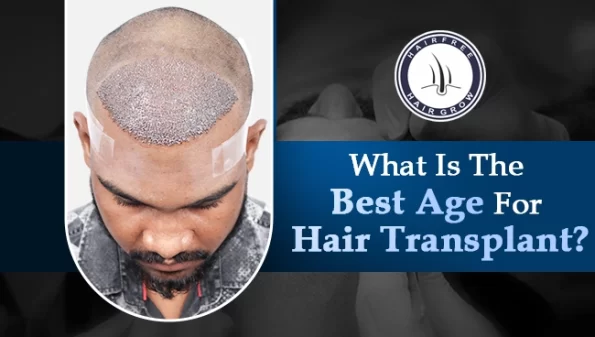Hair loss is a common problem that affects millions of people worldwide, and it can have a significant impact on self-esteem and confidence levels. Hair transplant surgery has become a popular solution for those looking to restore their hairline and achieve a fuller head of hair. However, many people may wonder what the best age is to undergo a hair transplant procedure. Factors such as the extent of hair loss, age, and overall health can play a role in determining the ideal timing for a hair transplant. In this discussion, we will explore the best age for hair transplant and the factors that individuals should consider before undergoing the procedure.
The Best Age For Hair Transplant
The best age for a hair transplant is not a fixed number, as it can vary depending on individual circumstances. While technically a person can undergo a hair transplant after the age of 18, it is generally recommended to wait until after the age of 22. This is because by the age of 22, most people have completed their natural hair growth cycle and their pattern of hair loss has stabilized, making it easier to determine the extent of the hair loss and plan the transplant accordingly.
However, it’s important to note that the progress of hair loss can vary greatly from person to person, and some individuals may experience significant hair loss at an earlier age. In such cases, a hair transplant may be considered earlier as long as the individual is in good health and has a donor area with suitable hair follicles for transplantation.
Factors to Help Determine the Right Age for a Hair Transplant
The ideal age for a hair transplant can vary depending on various factors and individual circumstances. Generally, candidates for hair transplantation should be in good overall health and have realistic expectations about the results. However, there are some considerations that can help determine the right age for a hair transplant:
Age-Related Hair Loss
Hair loss can occur at different ages due to various factors such as genetics, hormonal changes, and medical conditions. If the individual is experiencing significant hair loss at a young age, it may be advisable to wait until the pattern of hair loss stabilizes before considering a hair transplant. This is because the transplanted hair may not be resistant to the effects of hair loss hormones, and further hair loss may occur after the transplant, resulting in an unnatural appearance.
Donor Hair Availability
The availability and quality of the donor’s hair are crucial for the success of a hair transplant. Donor’s hair is typically harvested from the back and sides of the scalp, which are usually more resistant to hair loss. In younger patients, the donor hair may not have reached its full potential in terms of thickness and density and may not be suitable for transplantation. It is important to assess the donor’s hair availability before proceeding with a hair transplant.
Overall Health
The overall health of the patient is an important consideration for any surgical procedure, including hair transplantation. Older patients may have underlying health issues that could affect their ability to undergo surgery and recover from it. It is important to have a thorough medical evaluation to ensure that the patient is in good health and able to tolerate the procedure.
Expectations and Goals
It is important for patients to have realistic expectations about the results of a hair transplant. Hair transplantation is not a cure for baldness, and the results may vary depending on various factors. Younger patients may have higher expectations for a full head of hair, and it is important to manage these expectations to avoid disappointment.
Frequently Asked Questions
Should I Get a Hair Transplant at 24?
As long as you have hair loss that can be treated with surgery, adequate donor area, and no underlying medical or surgical contraindications, you can consider getting a hair transplant at 24 or any age. It’s important to consult with a qualified and experienced hair transplant surgeon to determine if you are a suitable candidate for the procedure.
Can a Hair Transplant Take 2 years?
Most patients start seeing results from their hair transplant between six and nine months after the surgery. However, for some patients, it may take up to 12 months to see the full results. It’s important to note that the transplanted hair may fall out between two and eight weeks after the surgery, but new hair will eventually grow in its place.
Can You Go Bald After a Hair Transplant?
It is unlikely that you will continue to experience a pattern of baldness after a hair transplant, as the transplanted hair follicles are typically resistant to the effects of DHT (dihydrotestosterone), which is the hormone responsible for male pattern baldness. However, it’s important to note that hair loss can still occur in non-transplanted areas of the scalp that are susceptible to DHT.
Do Hair Transplants Turn Grey?
Hair transplant surgery itself does not affect the color of your hair. However, in rare cases, the transplanted hair may start to turn grey prematurely if the donor area from which the hair was harvested is already grey. This is because the transplanted hair takes on the characteristics of the donor area. However, this will not affect the overall health or lifespan of the transplanted hair.
Do Hair Transplants Go Wrong?
Hair transplant surgery is generally safe, but like any surgical procedure, there are risks involved, such as bleeding, infection, or allergic reactions to anesthesia. It’s important to choose a qualified and experienced hair transplant surgeon to minimize the risks of complications. It’s also important to have realistic expectations about the results of the surgery and follow post-operative care instructions carefully to ensure the best possible outcome.
Conclusion
In conclusion, there is no one “best” age for hair transplant as it ultimately depends on individual factors such as the degree of hair loss and overall health. However, it is generally recommended that individuals wait until their mid to late 20s when their pattern of balding has stabilized, and the donor area has enough hair for transplantation. It is important to consult with a qualified hair transplant specialist who can evaluate your specific situation and provide personalized recommendations.
Written By
MD (Skin & VD)
Dr Santpal Sangwan is India’s most renowned hair transplantation and hairline restoration surgeon. His ample experience in hair plantation field can guide you in deciding after what age you should consider hair transplant.
Disclaimer
We’ve made all possible efforts to ensure that the information provided here is accurate, up-to-date and complete, however, it should not be treated as a substitute for professional medical advice, diagnosis or treatment. See Detailed Disclaimers Here.



